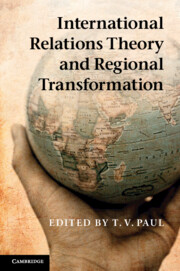Crossref Citations
This Book has been
cited by the following publications. This list is generated based on data provided by Crossref.
Bojinović Fenko, Ana
2013.
Regions Up and Down; (re)Defining the Nature and Effects of the European Union Regional Agency.
Journal of European Integration,
Vol. 35,
Issue. 1,
p.
91.
Smith, Keith
2014.
Realist Foreign Policy Analysis with a Twist: The Persian Gulf Security Complex and the Rise and Fall of Dual Containment.
Foreign Policy Analysis,
p.
n/a.
Thompson, William R.
2014.
Status in World Politics.
p.
219.
Kirchner, Emil J.
and
Dominguez, Roberto
2014.
Security governance in a comparative regional perspective.
European Security,
Vol. 23,
Issue. 2,
p.
163.
Chakma, Bhumitra
2014.
South Asia in Transition.
p.
1.
Göl, Ayla
2015.
Imagining the Middle East: the state, nationalism and regional international society.
Global Discourse,
Vol. 5,
Issue. 3,
p.
379.
Bekkevold, Jo Inge
and
Till, Geoffrey
2016.
International Order at Sea.
p.
3.
Russo, Alessandra
2016.
Regional security governance in the former Soviet space? Researching institutions, actors and practices.
Journal of Contemporary Central and Eastern Europe,
Vol. 24,
Issue. 3,
p.
273.
Oliveira, Jessica da Silva C de
2017.
The Place of the Region in IR.
Contexto Internacional,
Vol. 39,
Issue. 1,
p.
97.
Chakma, Bhumitra
2018.
SAARC and region-building: is South Asia a region?.
Journal of the Indian Ocean Region,
Vol. 14,
Issue. 2,
p.
189.
Schunz, Simon
Gstöhl, Sieglinde
and
Van Langenhove, Luk
2018.
Between cooperation and competition: major powers in shared neighbourhoods.
Contemporary Politics,
Vol. 24,
Issue. 1,
p.
1.
Clementi, Marco
2018.
US Foreign Policy in a Challenging World.
p.
99.
Köstem, Seçkin
2018.
Different paths to regional hegemony: national identity contestation and foreign economic strategy in Russia and Turkey.
Review of International Political Economy,
Vol. 25,
Issue. 5,
p.
726.
Clementi, Marco
and
Pisciotta, Barbara
2018.
US Foreign Policy in a Challenging World.
p.
1.
Balzacq, Thierry
Dombrowski, Peter
and
Reich, Simon
2019.
Comparative Grand Strategy.
Barbieri, Giovanni
2019.
Regionalism, globalism and complexity: a stimulus towards global IR?.
Third World Thematics: A TWQ Journal,
Vol. 4,
Issue. 6,
p.
424.
Karpavičiūtė, Ieva
2021.
World Order Transition and the Atlantic Area.
p.
157.
Iftikhar, Mohid
and
Zhan, Jing Vivian
2022.
The Geopolitics of China’s Overseas Port Investments: A Comparative Analysis of Greece and Pakistan.
Geopolitics,
Vol. 27,
Issue. 3,
p.
826.
ERCAN, Arda
and
GÜRSEL, Serap
2022.
DEĞİŞEN ULUSLARARASI GÜVENLİK BAĞLAMINDA UZAY GÜVENLİĞİ VE UZAYDA SİLAHSIZLANMA ÇABALARII.
Gaziantep University Journal of Social Sciences,
Vol. 21,
Issue. 2,
p.
881.
Singh, Bhubhindar
2022.
Special issue on the ‘sources of peace and peaceful change in East Asia’1.
The Pacific Review,
Vol. 35,
Issue. 6,
p.
995.





